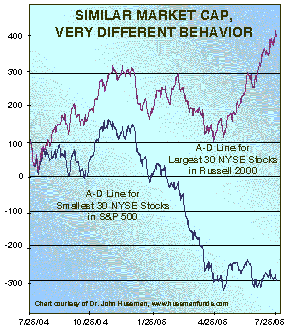Additional References
The Elliott Wave Theorist, August 2005
The Elliott Wave Financial Forecast postulates that the hedge funds are a major mechanism through which investors have extended so many trends. People have created and supported the hedge fund industry to express an extremely optimistic social mood. Why is this particular mechanism special? Because (1) hedge fund managers are paid primarily on profits and (2) they play with other people’s money. If a seasoned investor were buying only for his own account, he would never pay 1240 for the S&P, 680 for the Russell 2000, $450 for an ounce of gold, $65 a barrel for oil or $3m for a house with no money down. But novices don’t know better, and managers of other people’s money don’t care. The only way that the Russell 2000 index could have climbed to new all-time highs while the Dow, S&P and NASDAQ have lagged so substantially is that hedge funds have been targeting that index because other hedge funds are targeting it. It’s herding at its most primitive level; there is little rationalized analysis of companies, just the bulling of an index. The chart below from Dr. John Hussman reveals this stark preference, which is based entirely upon which index the stocks are in! Commodity markets are in the same situation. Oil and copper have made new highs while agricultural commodities languish at low prices. Nevertheless, every mania ultimately ends. There is no free lunch, no endless trend.
EWFF Short Term Update, August 19, 2005
The Hedge Funds index's tight shadowing of the S&P shows very clearly that these funds are manifestations of the upward surge in social mood. They came in together; and now that the public is being ushered in through lowered minimum investments of as little as $25,000 and state and city retirement systems are piling in (in much the same manner that they increased their equity exposure in late 1990s), they will go out together.
One of the ironies surrounding the recent rush to "hedge" funds is that many of are getting on board because they believe these instruments offer some protection from falling stock prices. But our all-the-same-market chart shows their tight correlation to the great reflation levitation that has guided markets since October 2002. Apparently, advances of Supercycle degree, like the current peak and that of 1929, produce super-organized investment groups that are extremely efficient miners of the social euphoria.
Hedge funds certainly herd like average investors. In fact, recent articles about the cliqueish behavior of hedge fund managers illustrate that they may be even more imitative. They all follow the same strategies, work in the same places and give to the same charities. There's virtually no office space in Greenwich, Connecticut, for example, because hedge funds are now lining up to move there. A few weeks ago there was that story in The Wall Street Journal about the trouble managers of new funds are having finding names. "It's nearly impossible to find a name that isn't taken," said the manager of a yet-to-be-named fund. But who says you have to name your fund after a Greek god, mountain range or solar system? A truly innovative manager with a distinct approach to making money should have no problem coming up with a moniker that implies stellar investment performance.
Conquer the Crash (2002)
Hedge Funds are only as good as their managers. Some fund managers use huge leverage and can “blow up,” losing everything on a bad bet. The more spectacular of those make the newspapers; there are others that just go quietly.
|
